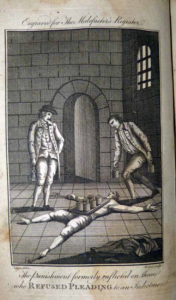Johnny was trying really hard to follow the rules of the road, but when he glanced in his rearview mirror, his stomach clenched. Flashing red and blue lights. Shit.
He pulled to the side of the highway, rolled down his window, and cut the engine. And when the cop walked to his window, Johnny even managed a shaky smile. “Good evening, officer.”
The cop didn’t smile back. “License, registration, insurance.”
Johnny handed over the documents and watched as the cop inspected them. Then the officer grunted softly and handed them back. “Everything looks in order. But you were following that other car pretty closely. It’s important to maintain a safe stopping distance. I could cite you for that.”
“Uh…. Sorry?”
“All right. I’ll let it go this time. But be more careful.”
Johnny’s lungs loosened enough for him to breathe. “Thanks, officer. I appreciate it. I’ll definitely be more careful.”
“Good.” The cop started to step away, then stopped and turned back to the window. “You don’t mind if I take a look in your trunk, do you?”
Trying not to choke, Johnny clearly pictured the ten pounds of methamphetamine currently sitting in the trunk. “Uh….”
So what can Johnny do?
Let’s begin by establishing one important thing: unless there are additional circumstances I haven’t mentioned in that scenario, the cop doesn’t have legal authority to search the trunk without consent. The Supreme Court has held that search warrants are virtually never needed for automobile searches, but law enforcement still generally needs probable cause to believe that the vehicle contains evidence or contraband. The fact that Johnny was following another car too closely doesn’t tell us anything about what may be in his vehicle; it certainly doesn’t give the cop probable cause.
So if the cop can’t force a search, is he out of luck? Nope. He can still ask Johnny for permission to look. That’s called a consent search, and police can ask for them any time they want to. But because it is a consent search, Johnny can refuse. His refusal alone won’t be enough to establish probable cause for the search. So if Johnny says no, the cop needs to let him continue on his journey. Lucky Johnny!
But here’s the rub—the cop doesn’t need to tell Johnny he has the right to refuse. This differentiates searches from interrogations, where the Miranda decision holds that suspects do have to be informed of their rights. Most people don’t know these details, and police often strongly hint that the subject needs to comply.
This tactic works well. Police find drugs via consent searches all the time, as in this recent example. Or this one. Why on Earth would someone with $3 million worth of meth in the trunk allow police to search his car? Because he thinks he has no choice.
One other twist on this situation. After the initial traffic stop, something might raise the officer’s suspicions that something is going on. Maybe the driver appears unduly nervous. If the cop has reasonable suspicion (which is less than probable cause) that the car contains something it shouldn’t, he can briefly extend the detention. This can last long enough to bring in a drug-sniffing dog and allow the dog to smell the car’s the exterior. If the dog alerts, that gives enough evidence to constitute probable cause, and now police can conduct a full search.
As for Johnny? I’d advise him to just say no.

